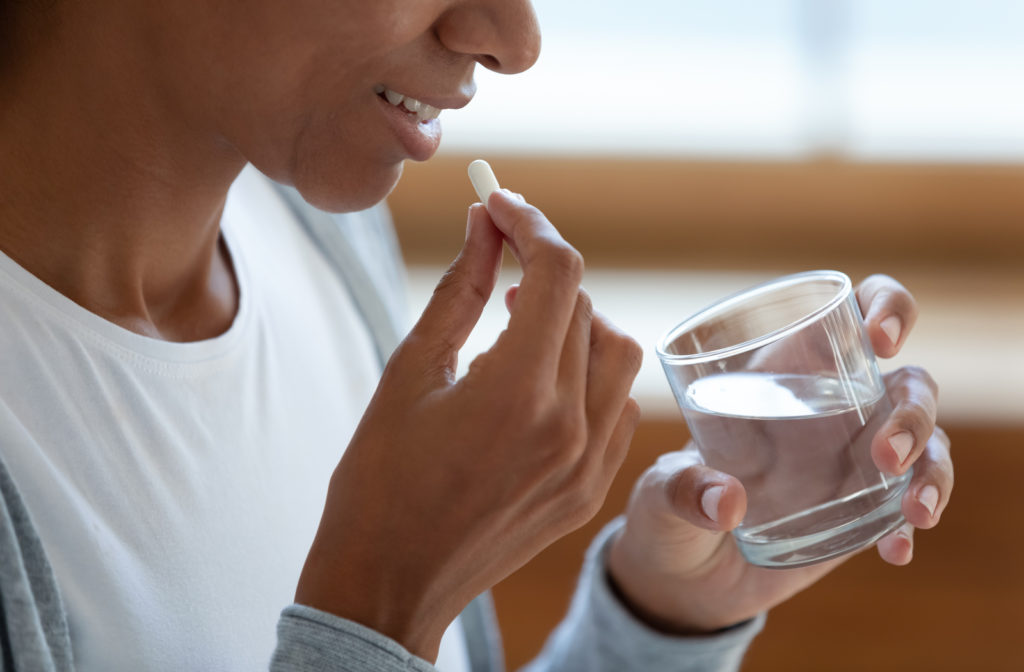If you suffer from dry eyes, there are many possible reasons why you’re experiencing them. Your optometrist can help determine the cause of your dry eye symptoms, such as age, medical conditions, or medications. If you take any medications, can they be the cause of your dry eyes?
Continue reading to learn more about dry eyes, including what medications can cause them to develop.
What Is Dry Eye Disease?
Dry eye disease is a common condition where your tears cannot effectively lubricate your eyes. You may experience tired and dry eyes after a long day, but prolonged symptoms are concerning.
Approximately 16 million Americans experience dry eye disease, living with uncomfortable symptoms.
Symptoms of Dry Eyes
You may experience several uncomfortable and annoying symptoms if you have dry eyes. These symptoms include:
- Itchy, stinging, or burning eyes
- Blurry vision
- A scratchy or gritty feeling in your eye
- Red, irritated eyes
- Difficulty wearing contact lenses
- Watery eyes
There may be several reasons you have dry eyes. With many possible factors relating to dry eye disease, it’s important to visit your optometrist for an eye exam. They can help determine the cause of your dry eyes.
What Causes Dry Eyes?
Dry eyes occur when issues arise within the tear film. Your tear film consists of 3 layers (oil, water, mucus) that help lubricate and protect your eye’s surface. When complications arise in one of these layers, it can lead to dry and irritated eyes.
You can experience increased evaporation, decreased tear production, or a combination of these causes.
Decreased Tear Production
Decreased tear production occurs when you can’t produce enough tears to effectively lubricate your eyes. Without the water needed for your tears, your eyes can become dry, leading to discomfort and redness.
This form of dry eye disease is more common with age, with tear production slowing down with time. Besides age, other causes of decreased tear production include:
- Certain medical conditions
- Side effects from certain medications
- Desensitized corneal nerves
Increased Tear Evaporation
Increased tear evaporation happens when there are issues with your tear quality. Complications usually occur with the oily layer of the tear film.
The glands in your eyelids, known as your meibomian glands, release oil that helps prevent your tears from drying out too quickly. However, issues with these glands can result in dry eye symptoms.
The clogging of the meibomian glands, known as meibomian gland dysfunction, is a common cause of increased tear evaporation. Other factors related to this form of dry eyes include:
- Infrequent blinking
- Wind, smoke, or dry air
- Vitamin A deficiency
- Posterior blepharitis
- Eye allergies
- Eyelid problems (ectropion & entropion)
Dry eye disease is a multifactorial condition with several causes, including your lifestyle choices, age, and medications. If you have a medication you regularly take, can it be a cause of your dry eyes?

What Medications Can Cause Dry Eyes?
Different medications can address different conditions, helping relieve your symptoms. However, the side effects of these medications may affect your tear film. Certain medications can affect your tear production and tear quality.
Antihistamines
Antihistamines can help prevent irritation from allergy triggers such as pollen, pet dander, and mold. They stop you from experiencing itchy and watery eyes, runny nose, and sneezing, but this medication can affect your tear film.
Antihistamines can cause you to produce fewer tears or cause your tears to evaporate more quickly than usual.
Antidepressants
Antidepressants block signals between nerve cells, helping treat depression. Parkinson’s medicine and sleeping pills work similarly. These medications can unexpectedly block the signals that tell your eyes to produce more tears.
It’s important to note that not all antidepressants work this way. Selective serotonin reuptake inhibitors (SSRIs) don’t interact with your body like this, but they can still potentially cause dry eyes.
Decongestants
Decongestants can help provide relief when you experience a stuffy nose due to a cold or allergies. They reduce swelling in the blood vessels within your nose, allowing more air to enter. Unfortunately, these medications can affect tear production.
Decongestants can cause you to produce fewer tears.
Acne Medications
If you suffer from acne, you may take a drug known as isotretinoin. This medication helps treat acne by reducing how much oil your glands create. While your acne will improve, the meibomian glands may produce less oil, causing your tears to evaporate faster.
Hormone Medications
Hormone medications, like birth control pills and hormone replacement therapy for menopause, can lead to dry eyes. There isn’t a known cause for why this occurs, but doctors believe these medications may affect how much water your body produces for your tears.
Blood Pressure Medication
Beta-blockers are a common type of blood pressure medication used to block your body’s response to adrenaline. This medication slows your heartbeat, lowering your blood pressure. A side effect of this medication is that your body creates less of a protein needed for your tears, causing decreased tear production.
Another blood pressure medication is called Diuretics. This medication helps your body remove salt and water, but this change can affect the development of your tears.
Don’t Suffer Through Your Dry Eye Symptoms
While dry eyes can vary in severity, you shouldn’t live with your symptoms. With help from your eye doctor, you can address dry eyes. They can recommend effective treatments to relieve your dry eye symptoms.
Contact your optometrist if you’re experiencing signs of dry eye disease.




